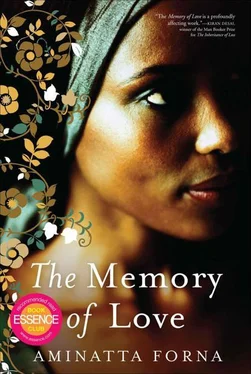‘Great,’ says Kai.
Foday grins.
‘How’s the physiotherapy?’ Kai leans forward and squeezes Foday’s other calf muscle, slight still from the weeks encased in plaster.
‘The lady, Miss Salinas, she says she is pleased with me.’
‘Good. You’re not overdoing it now, are you? We really don’t want you to run before you can walk, I mean it.’
Foday laughs. ‘No, Doctor Kai. Don’t worry. First I’m walking, then running. After that, maybe cartwheels. Please pass me my book.’
Kai passes him the exercise book. Foday opens it, removes a photograph and hands it to Kai. The picture shows a young woman of around nineteen sitting demurely on a stool in front of a hut, dressed in what appear to be her best clothes and shoes. Her smile is for the camera, for she looks shy, as though she is not used to being photographed.
‘Ah,’ says Kai. ‘Let me guess. Your fiancée?’ He studies the photograph for a few seconds more and gives it back to Foday.
‘No. She is not my fiancée. I would like her to be, though.’
‘Your girlfriend?’
‘Her name is Zainab. We were townsmates. She has sent me this picture of herself while I am in hospital. So you see, I think she likes me.’
‘It looks that way to me.’
Foday holds the picture up close to his face, then lowers it and smoothes it with his palm before replacing it carefully between the leaves of the exercise book. He passes the book to Kai and pulls himself further up the bed.
‘I would like to ask you something, Doctor.’
‘Sure,’ says Kai, once he has returned the book to its place. ‘Ask away, my friend.’
‘After my operations maybe I will go to Zainab’s family to put cola for her. That’s what I am thinking.’
‘OK.’
‘I will discuss it with Zainab first, of course. But if she has sent me this picture of herself, then I think she will consider me.’
‘I have no doubt Zainab will be happy for you to go to her parents.’
‘Thank you, Doctor. And you see, what it is I want to ask is whether you will come with me as my elder brother.’
For a moment Kai is quiet, then he says, ‘I would be honoured to come as your elder brother. But don’t you have any other brothers or uncles you want to ask?’
Foday shakes his head. ‘My elder brothers are away in the mines. Besides, if Zainab’s family see you, then I know they will want to accept me.’
Kai laughs. He reaches over and pats Foday on the shoulder. ‘Sure, my friend. I can do that. But you know the minute they see me they’ll double the bride gift, don’t you?’
‘I know.’ Foday shrugs. ‘But I have been putting aside little by little. The bride gift will be all right, I think. Besides, if Zainab wants me then she will speak to her parents.’
‘Then we have a deal.’ Kai offers his hand to Foday, and they shake, snapping fingers and punching each other on the knuckles. A minute or so later Kai prepares to leave, asks Foday if he needs something.
‘Maybe you can borrow me a radio?’
‘Sure, I’ll see what I can do.’
Kai should talk to Foday about his next operation, but he decides to leave it for the day. There’s no hurry. Foday’s greatest challenges are ahead of him. Kai knows this. Foday knows this. Meanwhile there is Zainab, waiting for him in her Sunday best.
Whatever it takes. Kai says these words to himself, whatever it takes.
Outside the ward he catches sight of Mrs Mara cutting the corner of the courtyard, struggling in her high heels across the uneven grass. He pauses a beat, to give her time to get ahead, then makes his way to Adrian’s apartment, where he knocks on the door at the same time as he slips the key into the lock. The apartment is empty. The kitchen is tidy and bare. He puts some water in the kettle and while he is waiting for it to boil searches out the old Philips transistor in the back of one of the cabinets. The radio is bulky and battered but serviceable despite a definable hiss. He drinks his coffee at the kitchen window. A sunbird descends, hovers briefly at the empty feeder, and is gone.
A few minutes later, so is Kai.
In Elias Cole’s room, a bustle of activity. Adrian waits in the corridor. In time a doctor emerges followed by a nurse wheeling a trolley of equipment.
‘How is he?’ Adrian asks of the doctor.
The man, a Swede, possessed of the crisp, antiseptic aloofness Adrian associates with Northern Europeans, looks at Adrian, according him the automatic respect of a fellow white man. ‘Not so great. But OK.’
‘Can I talk to him?’
‘Are you a doctor?’
‘I am a counsellor,’ he says.
‘Oh, I see. Well then, you may as well know he’s been treated with corticosteroids. Now it looks as if he’s stopped responding. That’s not so unusual. Steroids don’t work for everybody, and even when they do they don’t work for ever. The trouble is there aren’t very many other options from here on in. A lung transplant is out of the question.’ He bends a little closer to Adrian and lowers his voice. ‘I mean, how long have you been here?’
‘Since January,’ says Adrian.
The other man shakes his head. ‘He needs oxygen therapy,’ says the Swede, telling Adrian what he already knows. ‘He’s at risk from hypoxaemia. Oxygen will improve his quality of life and give him some months more to live. Only maybe. I’m going now to talk to the administrator about it.’
Good luck, thinks Adrian. He has spoken to Mrs Mara about an oxygen concentrator for Elias Cole three times. On each occasion she promised to see what she could do. So far she has done nothing. The demands upon her are many. The last few months of Elias Cole’s life are lost in the crowd.
‘Let me know how you get on,’ says Adrian. He watches the Swede walk away, his rubber clogs creaking on the concrete floor.
Inside the room Elias Cole is sitting up in bed. Over the last few weeks he has grown noticeably thinner, his face worn almost to the bone. Around his neck the skin rests in pleats. Standing at the end of the bed Adrian feels like the priest in an old black-and-white movie, the man of God hovering at the deathbed, waiting for his moment. To divest himself of this sensation he goes over to the window and looks out. A kingfisher sits on the telegraph wire. A moment later it is joined by another. Adrian watches them for a few moments, almost forgetting his purpose in being there.
He turns to the old man. ‘How are you feeling?’
Elias Cole smiles, a tugging of the corner of the lips. ‘That was the last call. I’m in the departure lounge now.’
Adrian laughs. ‘There’s still some time left.’
‘I’ve been warned I may begin to forget.’
‘That’s one of the possible effects of hypoxaemia. There’s no guarantee it’ll happen.’
‘There’s more I want to tell you.’
*
A year passed. For me, a year of waiting. There was the Forty Day ceremony. Do you know the forty days mark the end of a wife’s period of mourning? Among her own people Saffia would be considered ready for remarriage. Life here is too short to mourn for very long.
In November another Apollo mission landed on the moon. Nobody thought of throwing a party. The crew were supposed to send back colour TV images, but something went amiss and the feed failed. Saffia followed the news carefully on the radio, just as she had when the first astronauts came out of quarantine and gave a press conference. I knew she thought constantly of Julius. But as I said, it was a year of waiting.
Then it was 1970. The 1960s were over.
I watched Saffia struggle for survival. Following Julius’s death there were practical matters that needed to be considered. The independence which had so struck me at our first meeting had proved to be an illusion, of course. An illusion sustained and perpetuated by Julius, who had spoiled his wife. And also I suppose by the three of us, Kekura, Yansaneh and I, in our own way. For hadn’t we revered her? Did we not outdo ourselves to perform for her amusement? See ourselves as her guardians? We had taken Julius’s duties as our own. But now Julius was gone. Kekura fled. And Yansaneh broken. I alone was left.
Читать дальше












